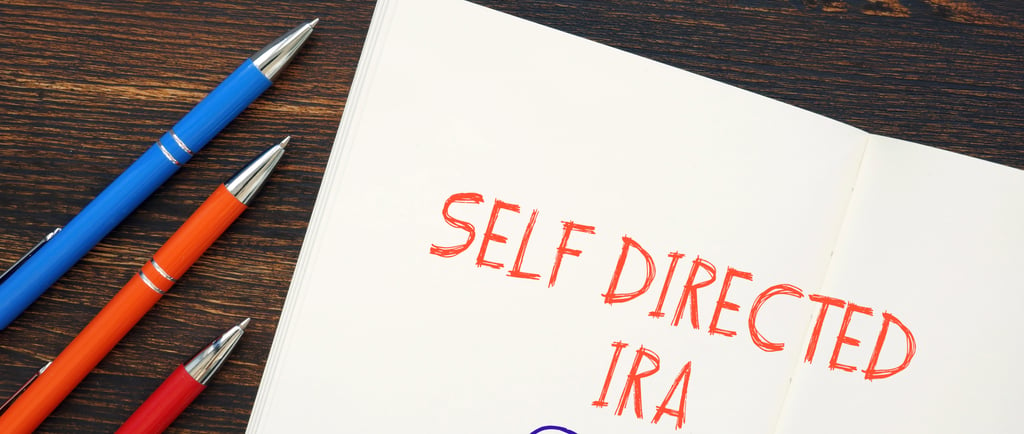

Disclosure: Clicking on links may earn me commission at no additional cost to you. Thank you for reading!
Discover how a self-directed IRA works and if it's the right retirement strategy for your unique financial goals.
Self Directed IRA (SDIRA): What It Is, How It Works
Disclaimer: This website and its content are for informational purposes only and is not financial advice.
Understanding Self-Directed Retirement Accounts
A self-directed IRA is a type of Individual Retirement Account that empowers the account holder to invest in a much wider array of assets than typically allowed in a conventional IRA.
While traditional IRAs offered by banks or brokerage firms usually limit your choices to publicly traded securities, a self-directed retirement account opens the door to alternative investments.
This means you, as the investor, have direct control over what assets your retirement funds are channeled into, moving beyond the standard market offerings. The core concept behind a self-directed retirement account is to provide greater flexibility and personalization in building your retirement portfolio.
How a Self-Directed IRA Works
A self-directed retirement account functions through a specialized custodian. This custodian holds the account assets and ensures IRS compliance, unlike traditional firms with limited investment options. The account holder maintains full control, directing all investment decisions.
The custodian's role is purely administrative: executing instructions and managing record-keeping and IRS reporting. They do not offer investment advice or due diligence. Funding a self-directed retirement account typically involves transferring or rolling over funds from existing retirement plans, after which you direct investments.
The Diverse Investments of Self-Directed IRAs
One of the most appealing aspects of a self-directed retirement account is the expanded universe of investment opportunities it presents. While traditional IRAs are often confined to stocks, bonds, and mutual funds, a self-directed retirement account allows for alternative assets, which can include:
Real Estate: This is perhaps one of the most popular alternative investments within a self-directed retirement account. You can invest in residential or commercial properties, raw land, mortgage notes, or even real estate investment trusts (REITs) that are not publicly traded.
Precious Metals: Gold, silver, platinum, and palladium in bullion form are eligible investments within a self-directed retirement account, provided they meet specific IRS purity standards and are held by an approved depository.
Private Equity: Investing in privately held companies, real estate private equity, esg private equity, startups, or private equity funds can be done through a self-directed retirement account.
Promissory Notes: These are essentially loans made to individuals or businesses, offering fixed interest payments.
Cryptocurrency: Digital currencies like Bitcoin and Ethereum can be held within a self-directed retirement account through certain custodians.
Tax Lien Certificates: These allow you to purchase liens on properties with delinquent taxes, potentially offering attractive returns.
Other Alternative Investments: The possibilities can extend to various other assets, including certain limited partnerships, hedge funds, and even livestock, as long as they are not explicitly prohibited by the IRS.
This wide range of options enables a self-directed retirement account holder to diversify their portfolio beyond traditional market fluctuations, potentially offering a hedge against inflation and economic downturns.
Updated May 29th, 2025
Share this:
Tax Advantages and Compliance with SDIRAs
Just like their conventional counterparts, self-directed retirement accounts offer significant tax advantages. Contributions to a self-directed Traditional IRA may be tax-deductible, and earnings grow on a tax-deferred basis, meaning you don't pay taxes on them until withdrawal in retirement.
For a self-directed Roth IRA, contributions are made with after-tax dollars, but qualified withdrawals in retirement are entirely tax-free. This tax-advantaged growth can be particularly beneficial if your alternative investments appreciate significantly over time.
The most critical aspect to understand is the "prohibited transaction" rules. These rules are designed to prevent self-dealing or conflicts of interest that could undermine the tax-sheltered status of your retirement account. Examples of prohibited transactions include:
Using self-directed IRA assets for your personal benefit or the benefit of certain "disqualified persons" (which include yourself, your spouse, your lineal ascendants and descendants, and any entities you control).
Buying or selling property between your self-directed IRA and a disqualified person.
Personally performing services, such as repairs or renovations, on property owned by your self-directed IRA.
All income generated from self-directed retirement account assets must flow directly back into the account, and all expenses related to the assets must be paid from the account.
Strict adherence to these rules is crucial, as violations can result in severe penalties, including the loss of your self-directed IRA's tax-advantaged status.
This underscores the importance of working with a reputable self-directed IRA custodian who can help ensure proper record-keeping and compliance.
The Role of Self-Directed IRA Custodians
Choosing the right self-directed retirement account custodian is a critical step. These specialized custodians are approved by the IRS to hold alternative assets within retirement accounts.
Their primary function is to administer the account, process transactions as directed by you, and handle all IRS reporting requirements. They act as fiduciaries, ensuring the assets are held securely and transactions are processed correctly.
It is important to remember that a self-directed retirement account custodian does not provide investment advice. Their role is purely administrative.
Therefore, it is highly recommended that you consult with a qualified financial advisor, legal professional, or tax expert before making investment decisions within your self-directed retirement account, especially when dealing with complex or illiquid alternative assets.
Potential Risks and Considerations
While a self-directed retirement account offers compelling advantages, it's crucial to be aware of the inherent risks and responsibilities.
Increased Due Diligence: Since you are directing the investments, the onus is on you to conduct thorough research and due diligence on every asset you choose. This is particularly true for alternative investments, which may not have the same level of transparency or readily available information as publicly traded securities.
Higher Fees: Self-directed retirement accounts typically come with higher fees than traditional IRAs due to the specialized administration required for alternative assets. These fees can include setup fees, annual administrative fees, and transaction fees for purchases, sales, and other services.
It's essential to understand the fee structure of any prospective custodian before opening a self-directed retirement account.
Illiquidity: Many alternative investments, such as real estate or private equity, can be illiquid, meaning they may be difficult to sell quickly if you need access to your funds. This can pose a challenge if unforeseen circumstances require immediate liquidity.
Fraud Risk: The Securities and Exchange Commission (SEC) has warned about potential fraud risks associated with self-directed IRAs. Unfortunately, fraudsters sometimes target self-directed retirement account holders, misrepresenting investments or falsely claiming to be IRS-approved custodians.
Always verify the legitimacy of any investment opportunity and the custodian you choose. Legitimate custodians will not offer investment advice or guarantee returns.
Complex Tax Rules: As mentioned, the IRS rules surrounding prohibited transactions and unrelated business taxable income (UBTI) can be complex. Missteps can lead to significant tax penalties, making it imperative to understand and strictly adhere to these regulations.
Final Thoughts
A self-directed retirement account is not for everyone. It is generally best suited for experienced investors who possess a solid understanding of alternative assets, are comfortable conducting their own extensive due diligence, and are willing to take on a higher level of personal responsibility for their investment outcomes.
If you are a sophisticated investor looking for greater control, diversification beyond traditional markets, and the potential for enhanced returns through alternative investments, a self-directed retirement account could be a valuable addition to your retirement planning strategy.
Subscribe to Newsletter
Get updates on new Gold IRA posts, market news, and more.
By Jordan McCaleb, Investment Researcher


